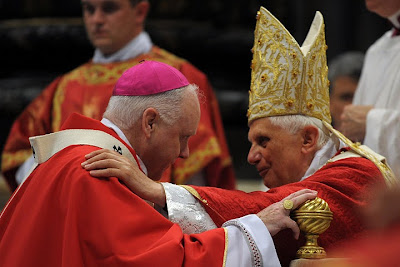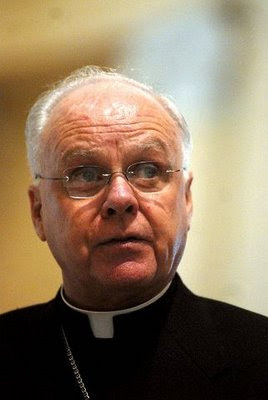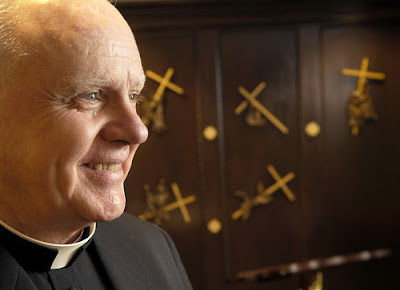
Indeed, it's rare to find a figure of modern global commerce who's had an impact on the life of mankind's most enduring corporate structure... with tonight's news of
Steve Jobs' resignation as CEO of Apple, though, it's worth re-running the pinnacle-proof of Cupertino's mark on Catholic life: Pope Benedict XVI -- long an owner of two early-model iPods (both white, of course) --
launching the Vatican's rebooted news-portal in late June with a
tap on an iPad.
To be sure, again, much as that's the high-water moment, it's far from the lone one. Because -- to borrow Umberto Eco's famous judgment --
"The Mac is Catholic" (...and
runs the Holy See's Internet Office, to boot).
For an institution whose upper reaches were long uninterested in (or taken aback by) the leaps and bounds of the technological revolution of recent decades -- a reality that, candidly, long stalled the recognition and growth of modern communications platforms into the ecclesial mainstream -- the watershed
ad intra shift of the last three or so years can be credited in large part to the "Cult of Mac," thanks to the ease and captivation Apple devices have garnered.
Put simply, the characteristic traits of Jobs' legacy served to break down iron-clad anxieties and spike fascinations over technology and its import to a degree which, in a first for our time, made a critical mass of senior prelates and the ecclesiastical policy-making world finally lose what often felt like an impenetrable sense of immunity. (Among many other instances of this, one need only survey the depth and speed of the sea-change at USCCB meetings -- among a group for whom, just four years ago, the number of smartphones or laptops could be measured on less than two hands, what often seems like a thousand iPads have bloomed... and that was just by last November.)

And as if it needed to be said, beyond the rungs, for no shortage of this church in full, the succeeding generations of Airs and apps, mice and multi-touch have changed what we know and how we learn it, what we can
see and
hear and
say, where we can experience it: how we work, how we live... and, above all,
how we
pray.
As contributions go, for the life of a communion, you can't really ask for more of a gift than that.
And beyond those, personally, these pages' own dent in the project likewise owes itself to the varied incarnations of OSX. For one, the news could only go so far if I tried shouting it out the front door... above all, though, even as the demands and strains of the work have grown since this shop's "conversion experience" five years ago next week, for everything I have had to worry about along the way, the devices and their ability to keep up have never been among them.
Ergo, for the overarching, immeasurable contribution of this scribe's iFlock (Phone, Pad, iMac and MacBook Pro, plus the now-retired
seniores) to the shop's productivity -- or, at least, the appearance thereof -- this Apple overconsumer remains eternally grateful, day in and day out... and on most days, for around 17 hours of each.
* * *
To put a finer point on it, two snips of prior texts from the off-page archive.

First, from a June 2010 talk to the diocesan IT directors of North America at their convention in Toronto....
"Another aspect we’d be very wise to address -- especially when it comes to reaching my generation, but well beyond, too -- is linked to this very device in my hand. [NB: an iPad]
Admittedly, even outside the church, I’ve become a true believer. In Apple. In my first full year of doing Whispers, I blew out three Dells and spent more time on a renter in Kinko’s than I can remember... but I’m grateful -- the experience allowed me to see the light and convert to the one true faith.
Of course, some of you might disagree, but the reality remains that -- full machinery aside -- what the iPod, iPhone and, now, iPad have done to push the boundaries of computing and revolutionize its experience in the marketplace cannot be overestimated.
Along these lines, I always watch the Apple keynotes, not just to salivate from afar over the latest goodies, but to hear the stats on the device’s penetration in the marketplace. And as they're given, part of me always wonders why we haven’t done a better job in engaging this staggering opportunity.
In his Monday rollout, Steve Jobs announced that, this month, the company will sell its 100 millionth device running iOS -- the new name for the iPhone platform. Given the release of the new hardware later this month and the ongoing sellout in most places of the iPad -- I found myself having to hit four stores before I could nab mine -- it’s clear they won’t be slouching toward the milestone, but rocketing quickly past it. [As an update, less than a year after this talk's delivery, said sales-figure more than doubled.]
That said, last time I checked, I was able to find all of one -- repeat: one -- diocese which had stepped into the App Store: New Orleans... a church whose entire infrastructure was effectively knocked out in [Hurricane] Katrina.
In effect, friends, we’re talking about a market that’ll soon be twice the size of the state of California, three times the population of Canada, a dozen times the size of New York City.
And still, for all that... the equivalent of one diocese? One chapel, as it were?
We need to do better than this. And we can.
Sometimes, and God knows how often it happens in the church, it’s easy to overthink things or feel powerless by some sort of preconception that “They’re not looking for what we’ve got” or “Why do we need to be there? They can just come to us.”
In a word, though, one thing -- maybe the most powerful thing -- I’ve learned these years is the extent to which our people are looking for us out there. But here’s the kicker: they’ll never ask for it; they’ll never say they’re looking for it. As the line goes, “if you build it, they will come.”
For the record, the number of diocesan apps has since tripled -- the archdiocese of St Louis launched
one for the iPhone in April, and just last week saw the rollout of an
iPad tool from the archdiocese of Chicago. Yet for a predominantly Anglophone market now numbering in excess of 200 million -- a figure larger than the Catholic populations of the US, Italy, Britain, France and Spain combined -- much more remains to be done.
Even so, it must be noted and duly lauded that -- whether it's been accomplished via MacOS, PC, Linux or whatever else -- the greatest efforts to date remain the fruit of no institutional gift, but the overwhelmingly unpaid time and unbidden programming done by pioneering layfolk, and even
some priests, who've taken to the task out of a simple conviction that the church and its cyber-reach deserved better and more than what they found, and who've realized that if no one else would something about it, they could.

...and lastly, from a reflection on faith and technology written around the
2007 debut of the device some would quickly dub the
"Jesus Phone":
"To be sure, Mac-heads aren’t known for moderating their enthusiasm for every word that comes from the mouth of Apple CEO Steve Jobs, and the release of what’s been dubbed “The God Machine” has become a cultural watershed, with press coverage rivaling Paris Hilton’s now-multiple jail stints.
When the first commercials for the device (which only a handful of people outside Apple’s top brass has even been able to touch yet) began airing last week, even devotees were quick to label them “iPhone porn.” Simultaneously, the enormous swath of cyberspace devoted to Apple gossip dissected the ads’ glimpses of the product with a compulsiveness that puts even the Catholic blogosphere's most anal-retentive liturgical critiques to shame.
(For the blissfully unaware, that’s an astonishing level of unhealthy hair-splitting.)
Some might see this as making God out of gadgets, or simply more proof of the end of the world. But no, it's neither -- even the hype bears a message of hope, and a challenge as big as the buzz.
First, let’s be grateful that people are getting excited about technology that actually has the capability of keeping them in touch with the rest of the world, as opposed to the usual frenzy over the newest video-game console that further seals its possessed into a virtual bubble. I might be computer-inclined, but I can’t help but think of PlayStation 3 or the Wii as further sentinels of the disintegration of mankind.
Second, the folks from Apple just seem to have an ability for captivating innovations in design, capability and ease of function. The company prides itself on its reputation for great aesthetics; inside and out, the clean lines and iconic looks of its product designs that (thankfully) have replaced the boxy, clunky old IIe models many of us 20-and-30-somethings used in our school days.
Message here? The quest for, and appreciation of, beauty still exists in the world -— and a bitten-into piece of fruit marks its vanguard.
As an amateur architecture buff, I can't help but see a parallel at work. While the modernist project in design sought to exalt utilitarianism, banishing what it saw as a superfluous emphasis on the “decorative,” the post-modern movement has restored the balance, as if to say, “Sure, functionality is helpful... but in our focus on function, the uplift of something bigger went missing.”
There’s an analogy of faith in this. People want to belong to something that makes greatness manifest in our own time, a movement that can show beauty and achievement as more than just traits of the past. If that weren’t true, today’s masses wouldn’t go to the ends of the earth -— or, alternatively, blow thousands of bucks after keeping vigil all night on a strip-mall pavement -— to it seek out, bring it home and plug it in.
As far as some of our own are concerned, man’s worthy expression of his God-given creativity seems to have halted sometime around 1570. Yet just as there’d be no internet without Gutenberg and no iPhone without Bell, tradition’s clock never stops ticking. It extends even into our own time. It becomes our responsibility to cultivate, grow and pass forward even richer than we found it, but just as faithful to its beginnings as it was before....
* * *
Not all that long ago, Apple itself had become a fallen legend, with much of the tech world seeing its most sensible future course as being shut down and liquidated.
All of a decade later, the company ends each market-day as either the most valuable company in the world or a close runner-up and, in its second rise, exponentially more a lodestar of the culture than it had been in its first.
What made the difference?

In a nutshell, its fidelity to the vision of the Founder -- the contagious passion and sense of newness it birthed... and, at its core, an ideal best summed up in the simple message he learned early on:
"Stay hungry, stay foolish."
And whether we're high-tech or dead-tree, Old Mass,
November Missal (or, in some cases, neither of the latter), maybe that example, and the stunning turnaround it birthed, could serve as a sign of hope and possibility for the ever-needed renewal of an oft-struggling church -- one that, today as ever, remains called to "go out into the whole world" through whatever means necessary.
Indeed, gang, the parallels are many... and this crowd would have a tough time finding a better user-guide for a modern push than the era that ends tonight.
After all, church, you're not exactly reading this on newsprint.
-30-

 And so, folks, for now, silence.
And so, folks, for now, silence.

































